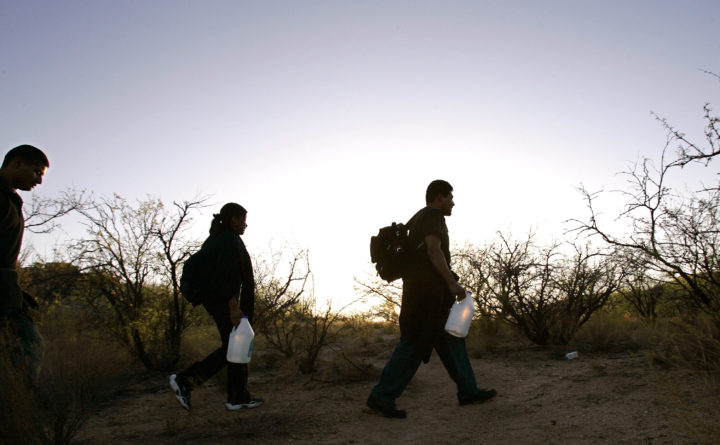- About
- Topics
- Story
- In-Depth
- Picks
- Opinion
- News
- Donate
- Signup for our newsletterOur Editors' Best Picks.Send
Read, Debate: Engage.
| August 07, 2018 | |
|---|---|
| topic: | Refugees and Asylum |
| tags: | #Transborder Immigrant Tool (TBT), #USA, #border control, #Mexico |
| partner: | Screen Shot |
| located: | USA, Mexico |
By Chloe Evans
To the EDT, and many others, it was clear that the increased border security, first intensified under the Clinton-era Operation Gatekeeper, had done little to deter migrants from making the journey, but instead served, and still serves, to push them away from historic travel routes with access to natural water and into desert landscapes with temperatures of 50 degrees celsius. The EDT worked closely with Humane Borders, an NGO that places brightly coloured water caches in the desert. To date, Humane Borders estimates that 10,000 people have died crossing the border since 1997, and have mapped 3,244 deaths since 1991 in the Southern Arizonan desert alone.
The EDT first started working on the Transborder Immigrant Tool (TBT) in 2007: a provocative mobile phone app that, if taken at face-value, provides experimental poetry to migrants who have already crossed the U.S.-Mexico border while leading them to water caches put out by NGOs in the Southern Californian desert.
The underlying idea behind the app is to highlight the fundamentals that someone stuck in incredibly hostile terrain on foot would need: water to survive and poetry to mentally sustain. The TBT was made to work even on a mobile on phone costing less than $20 by relying on a simple compass interface and a vibration setting that is initiated if the person is walking in the right direction—towards a water source. Written by Dr Amy Sara Carroll, the app provides the user with 24 hours of poetry described as an “echo of desert survival manuals” performed in multiple languages.
By creating a last-mile safety tool to be used by a person who has already crossed into the U.S. but is still in danger of dying of thirst, the TBT focuses on the basic human needs of those caught in limbo—those in the middle of the stale and the stalemate divide. Cleverly situating the TBT away from the physical border, the app exposes the country’s responsibility to those already well within U.S. soil and moves away from the fixation on illegal crossing. Or so one might think.
The app was tested over a period of two years (between 2008-2009) but as it was ready to move from prototype to the next stage of the design, it received such critical responses from right-wing politicians and press that the nature of the project changed. In 2010, Republican Members of Congress called upon the University of California (UC San Diego), where the app was being developed, to run three formal investigations in order to stop the development of the app, arguing that it was a misuse of university funding. “The investigation sought to take away my tenure for doing the very work I had been both hired to do and tenured for”, explains Ricardo Dominguez, founder of EDT and Professor of Visual Culture at UC. Following the publication of TBT, Dominguez and members of the EDT collective were criticised by right-wing media and harassed with a barrage of violent hate mail, urging them on several occasions to seek protection from the Department of Justice. This is one example of a personal email that Dominguez received:
“Hopefully, you traitors will be shot in the back of your heads when you least expect it. Isn’t it great that you’re relying upon the tax money of Americans to destroy America? Nearly all illegals from Mexico and Central America are NOT Spanish Europeans, but indigenous morons who never invented the wheel. FUCK YOU!”
One of the most unhinged comments was made by Glenn Beck, a Conservative politician who said on Fox news that TBT’s poetry had the power to “‘dissolve the nation”. Another critique was that the app is “an irresponsible use of technology”. The fact that an app created to help people dying of thirst is considered irresponsible while the U.S. is currently seeking help from DNA testing startups to reconnect separated migrant children with their parents after they have been lost in the system is a testament to the political power available in technology and more importantly—who gets to use it.
All three investigations were eventually dropped but by the time they were over, the EDT had decided that the app would not be used as Narcos were in control of the informal economy around border crossing, which they felt may make TBT users a potential target of violence.
The app never set out to help cross the actual border but was made from an understanding that the movement of people across it is unstoppable and with that EDT felt it was a part of their “commitment to global citizenship”, as Dominguez explains. Despite the growing security around the border and the proliferation of zero-tolerance immigration policies, people will always continue to migrate through it in search of a better, safer life: the app accepts this and asks us to dream of a time when technology could be a helpful tool for those making such a physically and mentally demanding journey, and not only to those stopping them. In a climate where global citizenship feels further and further out of grasp, it is important to think about the power of interventions such as the Transborder Immigrant Tool that challenge the reality of borders.
By copying the embed code below, you agree to adhere to our republishing guidelines.

